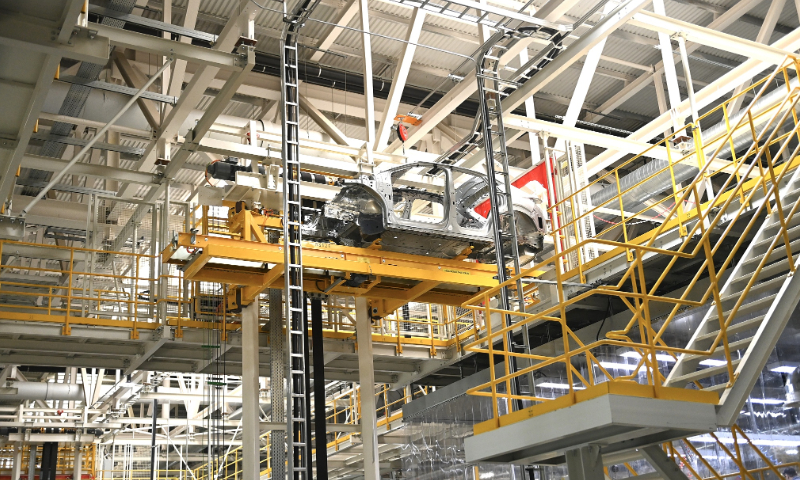Chinese EV firms continue to sign cooperation agreements with EU automakers despite bloc’s protectionism

Chinese electric vehicle (EV) enterprises including Xpeng and Chery have continued to sign cooperation agreements with EU automakers despite the bloc's decision to impose temporary tariffs on Chinese EVs.
Industry insiders and experts said that the move highlighted China's opening-up for a win-win situation in strong contrast to the bloc's protectionism. They noted that China and the EU have promising prospects for cooperation in the EV sector and urged the EU to face up to healthy competition with Chinese car companies.
Xpeng announced on Monday that the company and the Volkswagen Group are expanding their platform and software cooperation to jointly develop zonal electric/electronic architecture, which will turn pure electric models of the Volkswagen brand into software-defined vehicles in China, according to a statement it sent to the Global Times.
Ralf Brandstätter, board member of Volkswagen AG for China, said in the statement that it is a clear proof of the excellent cooperation between Volkswagen Group China Technology Co and Xpeng.
"This will not only strengthen the competitiveness of the company's global electric platform in China, but also reduce technological complexities and increase cost efficiency across the region," he noted.
"This collaboration between Xpeng and Volkswagen is a case of Chinese car companies exporting technology, which will lead to a win-win situation," Zhang Xiang, secretary general of the International Intelligent Vehicle Engineering Association, told the Global Times on Monday.
Chery and Jaguar Land Rover said on June 19 that they had signed a letter of intent covering strategic cooperation. Their joint venture company will launch and produce a series of electric products, equipped with Chery's electrification platform and using Jaguar Land Rover's authorized Freelander brand.
Leapmotor and Stellantis announced on May 14 that they had approved the establishment of Leapmotor International, a JV that is 51 percent owned by Stellantis and 49 percent by Leapmotor.
The JV has the exclusive right to conduct export and sales operations of Leapmotor vehicles to all other markets outside of China, as well as the exclusive right to produce the company's vehicle products locally.
Zhang said that compared with the EC's political aim of cracking down on Chinese EVs, European carmakers can directly feel the detrimental effects of the bloc's temporary tariffs on mutual cooperation. That's why European companies continue to strengthen cooperation with China despite pressure from the EU.
Chinese carmakers have mastered the core technology of new-energy vehicles with a high degree of intelligence, which can provide European consumers with cost-effective EVs, while building factories overseas can drive the development of the local industry chain, the expert noted.
While China continues to share its EV technology with the world, Chinese car companies are protesting the EU's protectionism and defending their rights and interests.
According to a statement sent to the Global Times on Monday, SAIC Motor Corp submitted its defense against the EC's anti-subsidy preliminary ruling at a hearing held by the EC on Friday, noting that it reserves the right to take further legal measures in response to the EC's unfair preliminary ruling.
During the hearing, the company noted that the EC's investigation involves commercially sensitive information, such as a request for cooperation in providing chemical formulas related to batteries, which is beyond the normal scope of the investigation.
"Open competition leads to progress, while protectionism will only result in backwardness. It is hoped that China and the EU will accelerate the cohesion of innovative forces through win-win cooperation and create global green development," the company said.
In the so-called investigation and evidence-gathering process on the European side, Europe embodies an increasingly unilateralist approach that the bloc has strongly opposed previously, said Cui Hongjian, a professor at the Academy of Regional and Global Governance under Beijing Foreign Studies University.
Since China is an important trading partner for Europe, disputes should be resolved as peacefully as possible and in a legally compliant manner, Cui told the Global Times, noting that establishing close cooperation with China is the best long-term solution for the development of the European industry.